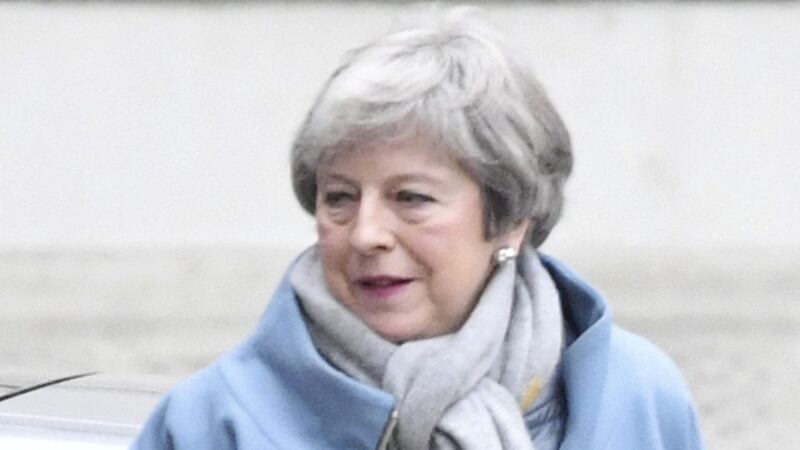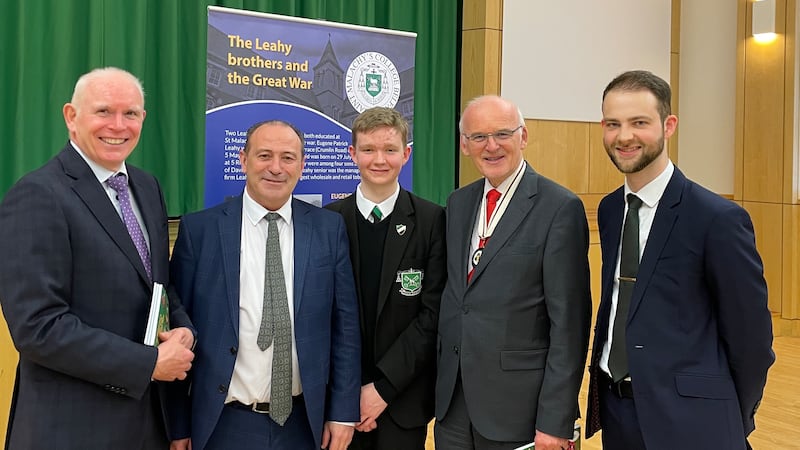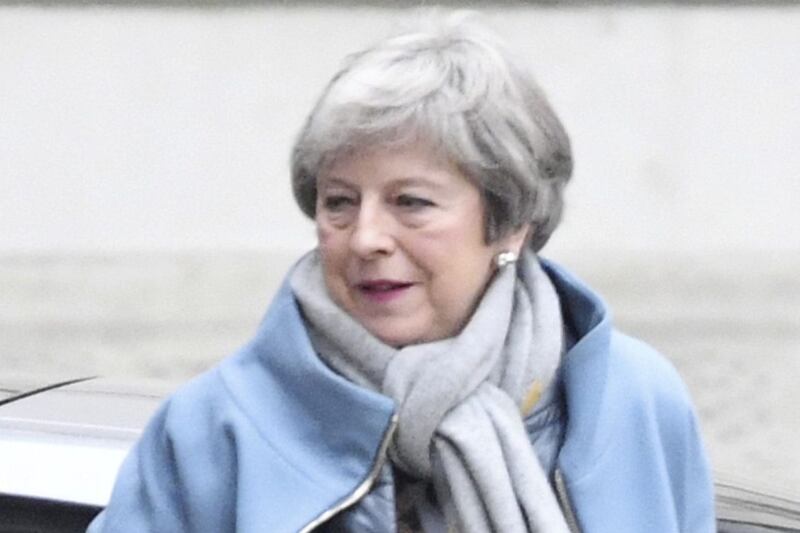Theresa May will insist that she can secure a Commons majority for a Brexit deal that "commands broad support" in Northern Ireland as efforts continue to find an alternative to the controversial backstop.
The British prime minister is to visit the north today to give a speech in which she will confirm the British government's "absolute commitment" to avoiding a hard border after Brexit.
Mrs May's trip, which will also take in talks with businesses, comes as she prepares to return to Brussels to demand the reopening of the EU Withdrawal Agreement.
It was confirmed this morning that Mrs May will meet European Commission president Jean-Claude Juncker in Brussels on Thursday. Mr Juncker is set to meet Taoiseach Leo Varadkar tomorrow.
DUP leader Arlene Foster said she would again stress to Theresa May her party's opposition to the backstop during today's visit.
Mrs Foster told BBC Radio 4's Today programme: "We will be reiterating our opposition to the current backstop. And the fact that Parliament has now backed that position means that she (Mrs May) has a clear mandate to go back to Brussels.
"Parliament's mandate is to replace the backstop. The current backstop, as I have said all along, is toxic to those of us living in Northern Ireland, and indeed for unionists right across the United Kingdom, because it would cause the break-up of the United Kingdom into the medium and longer term."
The DUP leader said: "Nobody wants to see a hard border on the island of Ireland.
"But, it cannot be at the expense of a hard border internally in the United Kingdom because that is simply not acceptable."
When it was put to Mrs Foster that her stance on the backstop could force a no-deal Brexit, she said: "Well actually, I could reverse that... by saying through the intransigence of the European Union and the Republic of Ireland in their attitude, they are actually more likely to bring about the very thing that they want to avoid."
Labour MP Anna McMorrin, a supporter of the People's Vote campaign for a second referendum, said: "Backstop or no backstop, the Brexit deal is still bad news for Northern Ireland and that should not be forgotten.
"Backstop or no backstop, the deal would damage the economy of Northern Ireland. Manufacturers in Northern Ireland sell £10.5 billion of goods to Great Britain every year and it has long been known that if Great Britain gets an economic cough, Northern Ireland goes down with the flu.
"Backstop or no backstop, the deal threatens to weaken security in Northern Ireland. While the focus is on dissident republicans or loyalist organised crime, Northern Ireland is just as vulnerable as any other part of the UK to other terrorist or serious criminal threats, and the deal leaves the UK with no guarantees on further security co-operation and access to key EU crime fighting databases.
"Backstop or no backstop, the deal will deepen divides in Northern Ireland. Today, whether a resident of Northern Ireland holds an Irish or a British passport makes no difference to their rights and their status. That is the very foundational principle of the Good Friday Agreement. Backstop or no backstop, that will change after Brexit."
Shadow Brexit secretary Sir Keir Starmer moved to clarify Labour's position on the backstop, after Jeremy Corbyn suggested last week he would have "a problem" with a "one-sided" arrangement.
Speaking in Belfast, Sir Keir said: "We recognise there is a need for a backstop at this stage of the exercise.
"The prime minister has effectively run down the clock and therefore it is impossible to see a way forward without a backstop. So, whilst we have got concerns that we have set out about the backstop, we do accept the principle that there has got to be a backstop."
Meanwhile, Downing Street poured cold water on speculation over an early election, saying that the prime minister was "absolutely not" considering a vote on June 6.
The spokesman also said it was "simply not true" the government was drawing up plans for the evacuation of Queen Elizabeth from Buckingham Palace in the case of civil unrest after a no-deal Brexit.
The comments came as justice secretary David Gauke became the latest Cabinet minister to suggest Brexit might have to be delayed beyond the scheduled date of March 29.
"We need to leave the European Union in a smooth and orderly way, and our objective is to do that on March 29, but I think it is important that it is a smooth and orderly departure and that is key," Mr Gauke told BBC Radio 4's Today.
Mrs May's spokesman insisted: "She is absolutely determined to deliver Brexit on time. That means March 29."
Rebel Tory MPs have been invited for a series of meetings chaired by Brexit secretary Stephen Barclay to explore ideas which could offer Mrs May a way forward after the emphatic Commons rejection of her Withdrawal Agreement.
At the heart of the changes being demanded by Conservative Eurosceptics is the removal of the so-called "backstop", designed to keep the Irish border open in the absence of a broader trade deal.
German Chancellor Angela Merkel said the EU was ready to listen to proposals to solve the border "riddle", but needs to hear from Britain how it thinks it can be done.
Speaking during a trip to Japan, Ms Merkel said: "To solve this riddle, you have to be creative and you have to listen to one another.
"We can have those conversations, so we can use the remaining time to perhaps remove the obstacles that have so far stood in the way and find an agreement if everyone is willing.
"But we must hear from Great Britain how they want to do it."
Mrs Merkel's visit for talks with Japanese PM Shinzo Abe came days after a new EU-Japan trade deal came into force and a day after Nissan confirmed it was ditching plans to build its X-Trail SUV in Sunderland.
The company said the decision was largely driven by changing demand for diesel models but added that "uncertainty around the UK's future relationship with the EU is not helping companies like ours to plan for the future".
Hardline Eurosceptics in the European Research Group (ERG) and Remain-supporting former ministers were gathering in the Cabinet Office for the first meeting of the new Alternative Arrangements Working Group (AAWG).
ERG deputy chairman Steve Baker, former Northern Ireland secretary Owen Paterson and Yeovil MP Marcus Fysh will sit around a table with former education secretary Nicky Morgan and ex-Cabinet Office minister Damian Green to examine the feasibility of the so-called Malthouse Compromise.
Downing Street confirmed that they will meet with Mr Barclay on each of the first three days of this week and did not rule out further meetings beyond that date.
The PM's spokesman said the group would be moving "urgently" to draw up proposals "as soon as possible". Downing Street has previously suggested that these might revolve around a time-limit or unilateral brake on the backstop or technological solutions to keep traffic flowing over the border.
Mrs May last week told the Commons that the Malthouse Compromise – named for housing minister Kit Malthouse, who coordinated meetings bringing together the Remain and Leave wings of the party – was "a serious proposal that we are engaging with sincerely and positively".
But the chairman of the Commons Brexit Committee, Hilary Benn, said: "Personally, I don't see how it can work – particularly in the very short amount of time that there is left."
Speaking as the committee visited Brussels for private talks with EU officials, Mr Benn said the British government and EU had already put a great deal of effort into exploring a technological solution, only to conclude that: "It's not going to work."
Former foreign secretary Boris Johnson accused the Tory leadership of using rumours of an early election as a "scare tactic" to bounce exhausted Conservative MPs into backing her Withdrawal Agreement.
In his Daily Telegraph column, Mr Johnson said the Conservatives would go into an early election with "a hole in the heart of our manifesto" because they do not have a settled EU policy.


